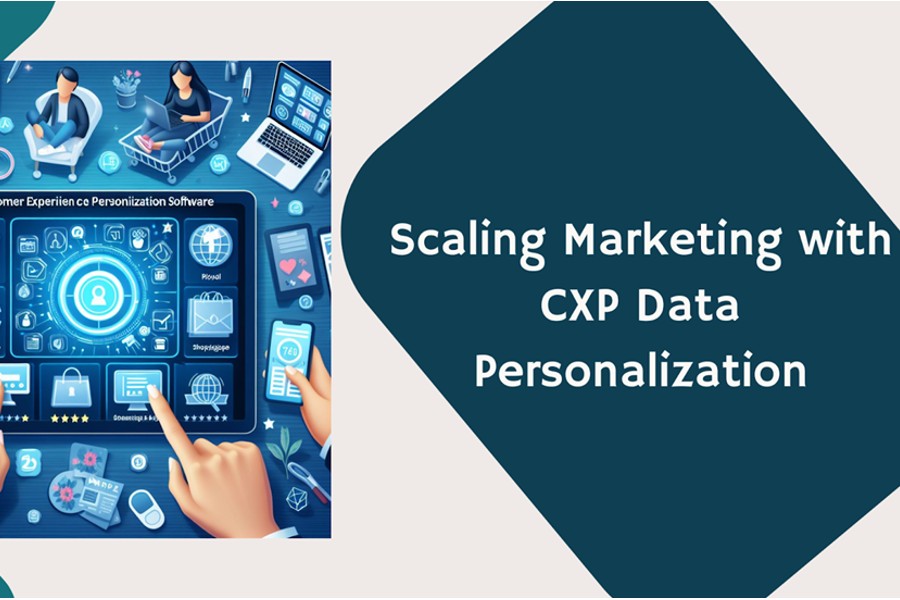
Customers crave personalized experiences, yet delivering them at scale remains a challenge for marketers. Customer Experience Personalization (CXP) powered by data holds the key.
This approach leverages advanced analytics and AI to unlock deep insights into customer behavior, preferences, and journeys.
By understanding each individual, businesses can craft tailored content, offers, and experiences that truly resonate, driving engagement, loyalty, and revenue growth. However, scaling CXP data personalization requires robust strategies, cutting-edge technologies, and addressing privacy concerns and operational hurdles.
This guide explores practical strategies, and future trends, equipping you with the knowledge to unlock the full potential of personalized marketing.
The Evolution of CXP and Its Impact on Marketing Strategies
The concept of CXP has undergone a remarkable transformation over the years. What began as simple mail merge techniques has evolved into a sophisticated art form, leveraging cutting-edge technologies and vast data sets to craft deeply personalized experiences. This shift has revolutionized marketing strategies, empowering businesses to move away from one-size-fits-all campaigns and towards highly targeted, contextual interactions.
The above statements are also supported by the increasing revenue for CXP software over the years as depicted in the chart below.

As consumers increasingly demand relevance and authenticity, businesses that fail to adopt CXP risk falling behind. Conversely, those who embrace data-driven personalization enjoy a significant competitive advantage, fostering deeper customer connections and driving measurable results.
Advanced Analytics and AI in Personalizing Customer Experience
At the heart of CXP lies the power of advanced analytics and artificial intelligence (AI) embedded in modern CX software and automation platforms. By integrating AI technologies, businesses can interpret vast data sets and uncover valuable insights into customer behavior, preferences, and journeys.
But, what is CX software, and how does it transform these insights into action?
CX software refers to the suite of tools designed to manage the customer experience across various touchpoints. These tools encompass CX automation platforms that streamline and automate the process of delivering personalized content, offers, and experiences.
By leveraging AI and CX automation, companies can analyze customer data in real-time, detect emerging patterns, and make accurate predictions. This capability ensures that businesses can deliver the right message at the right time through the optimal channel, significantly enhancing the effectiveness of their marketing efforts.
These insights fuel the creation of highly personalized content, offers, and experiences tailored to each customer, following CX’s best practices. This level of personalization transcends generic experiences, allowing companies to truly connect with their customers on a profound level and drive better results.
Strategies for Implementing CXP Data Personalization at Scale
While the benefits of CXP are clear, scaling personalized marketing efforts across an organization presents unique challenges. Fortunately, several strategies and technologies, including CX automation platforms, have emerged to streamline this process:
1. Data Management Platforms (DMPs): These powerful platforms aggregate and segment customer data from various sources, enabling businesses to create highly targeted audience segments for personalized campaigns.
2. Machine Learning: By harnessing the power of machine learning algorithms, businesses can predict customer behavior and preferences with unprecedented accuracy, enabling them to deliver the right message, at the right time, through the right channel.
3. Personalization Engines and CX Automation Platforms: These specialized platforms integrate with existing marketing tools and leverage AI and machine learning to dynamically personalize content, offers, and experiences across multiple touchpoints, ensuring a consistent and tailored customer journey.
By combining these strategies, technologies, and CX automation platforms, businesses can effectively scale their personalization efforts, delivering highly relevant experiences that resonate with each customer, and driving engagement, loyalty, and revenue growth.
Challenges and Solutions in Scaling Personalized Marketing
While the benefits of CXP data personalization are undeniable, scaling these efforts presents several challenges that must be addressed:
1. Balancing Personalization with Privacy Concerns: As personalization becomes more granular, concerns around data privacy and consent arise. Businesses must strike a delicate balance, ensuring they respect customer privacy while still delivering relevant experiences.
The solution lies in transparent data practices, clear communication, and providing customers with control over their data and preferences.
2. Overcoming Technical and Operational Hurdles: Implementing personalization at scale requires significant technical capabilities, data infrastructure, and organizational alignment.
To overcome these hurdles, businesses should invest in robust data platforms, leverage cloud technologies for scalability, and foster cross-functional collaboration between marketing, IT, and data teams.
By addressing these challenges proactively, businesses can unlock the full potential of CXP data personalization while maintaining customer trust and operational efficiency.
Measuring the Success of Personalized Marketing Campaigns
As with any marketing initiative, measuring the success of personalized campaigns is crucial to optimizing strategies and demonstrating return on investment (ROI). Businesses must closely monitor key performance indicators (KPIs) to gauge the effectiveness of their personalization efforts.
Conversion rates, such as sales, sign-ups, or lead generation, serve as direct measures of campaign success. Additionally, analyzing customer lifetime value (CLV) provides insight into the long-term impact of personalized campaigns on customer acquisition and retention.
Engagement metrics, including website traffic, time on site, bounce rates, and social media interactions, offer a comprehensive view of how personalization influences customer behavior and interactions. Leveraging powerful analytics tools is essential for tracking and analyzing this wealth of performance data.
By consistently measuring and analyzing these metrics, businesses can quantify the impact of their personalization efforts, identify areas for improvement, and ultimately maximize the ROI of their CXP data personalization initiatives.
Future Trends in CXP Data Personalization
The realm of CXP data personalization is constantly evolving, driven by technological advancements and shifting consumer expectations. Two key trends are shaping the future of this space: predictive analytics and customer data platforms (CDPs).
As AI and machine learning capabilities advance, predictive analytics will play an increasingly significant role in personalization. By anticipating customer needs and preferences before they even arise, businesses can deliver proactive, highly tailored experiences that exceed customer expectations.
Predictive models will enable companies to stay ahead of the curve, offering personalized recommendations, offers, and content that truly resonate with each individual. While data management platforms (DMPs) aggregate data for segmentation, CDPs take personalization a step further by creating unified customer profiles that span multiple touchpoints.
These platforms enable businesses to deliver seamless, consistent personalized experiences across all channels, ensuring a cohesive customer journey. CDPs will become increasingly crucial for businesses aiming to provide a truly omnichannel personalized experience.
To stay ahead of the curve, businesses must embrace these trends, invest in the latest technologies, and continuously adapt their personalization strategies to meet the ever-changing demands of the modern consumer. Failure to adapt may result in falling behind competitors who successfully leverage these cutting-edge solutions to deliver unparalleled personalized experiences.
Frequently Asked Questions (FAQs)
1. How can marketers ensure privacy while personalizing content at scale?
Balancing personalization and privacy requires transparent data practices, clear communication with customers, and providing control over data usage and preferences.
2. What are the key technologies driving the scalability of personalized marketing?
AI, machine learning, data management platforms (DMPs), customer data platforms (CDPs), and CX automation platforms are central to scaling personalized marketing efforts effectively.
3. How can businesses measure the ROI of their personalization efforts?
Businesses can measure ROI by tracking conversion rates, customer lifetime value (CLV), and engagement metrics, and leveraging analytics tools and A/B testing platforms.
Conclusion
CXP data personalization is no longer a luxury; it’s a necessity for businesses to thrive in the age of customer-centric marketing. By mastering data-driven personalization strategies, investing in the right technologies, and addressing challenges head-on, companies can deliver exceptional, tailored experiences that forge deeper connections and drive measurable results. Discover the power of personalization, and unlock a world of unprecedented customer engagement and growth.
Become a Harlem Insider!
By submitting this form, you are consenting to receive marketing emails from: Harlem World Magazine, 2521 1/2 west 42nd street, Los Angeles, CA, 90008, https://www.harlemworldmagazine.com. You can revoke your consent to receive emails at any time by using the SafeUnsubscribe® link, found at the bottom of every email. Emails are serviced by Constant Contact








